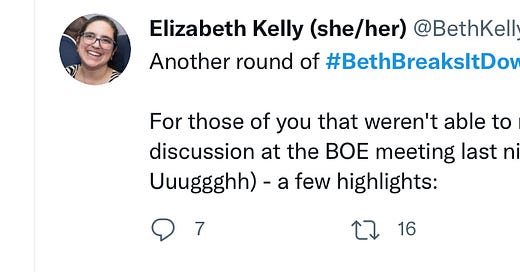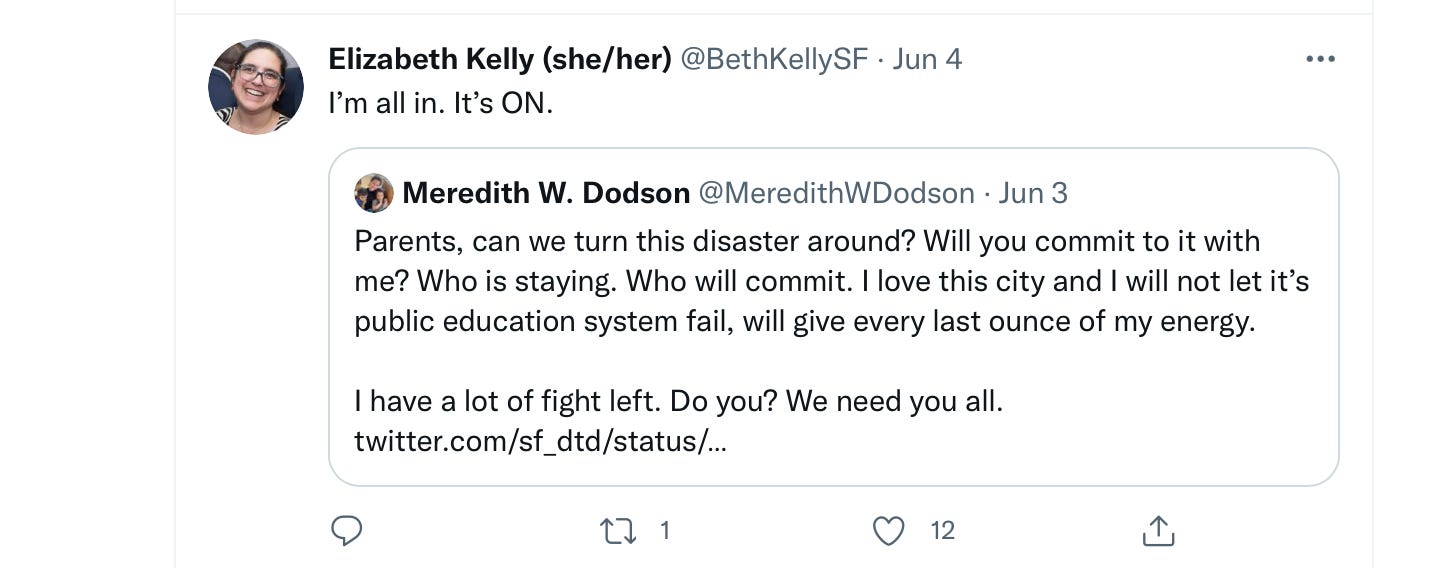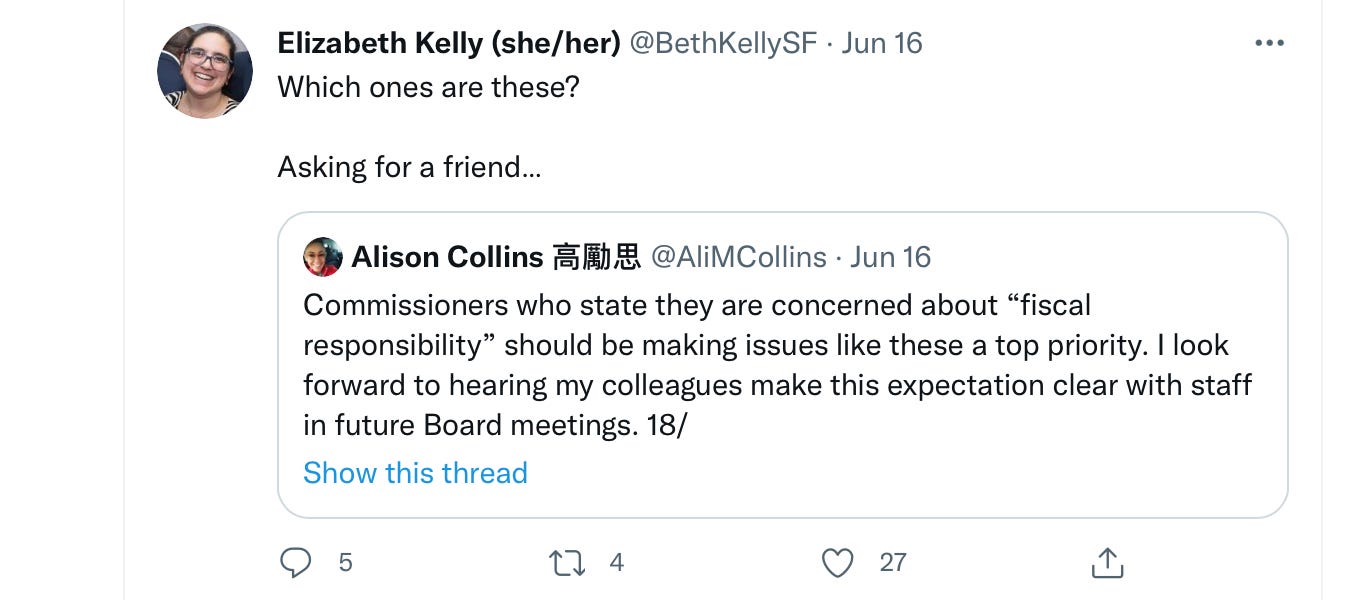“I don’t know, but you have to look up Beth Kelly on Twitter.” I heard that line from just about everybody. Then I looked up her tweets. Oh yes, I now totally understand why they all said that. Beth Kelly, self-described SFUSD budget geek, through her tweet threads (@BethKellySF) popularized as #BethBreaksItDown, has become the go-to source for all things San Francisco Unified School District (SFUSD) budget-related.
Figure 1: Beth Kelly, @BethKellySF on Twitter, posts one of her many tweet threads analyzing the SFUSD budget, under the hashtag #BethBreaksItDown
Byzantine and unwieldy for most parents, the school district budget of over $1 billion affects more than 50,000 students and their families, thousands of teachers and district staff and other employees, over a hundred schools, one Superintendent, and seven San Francisco Board of Education (SFBoE) Commissioners. Where does one even start?
One good place to start is a June 3, 2021 video from community group TogetherSF, Introduction to the SFUSD Budget, with Kelly, Board Commissioner Jenny Lam, and SFUSD Chief Financial Officer (CFO) Meghan Wallace. Through quite a bit of terrain, Kelly served as host and guide.
Prior to hosting this video, Kelly made a name for herself on this topic on Twitter. Just before or just after each Board Meeting or Budget Committee Meeting, Kelly clearly tweeted out her take on budget presentations, both the good and the bad. From deep dive to big picture, Kelly distilled the numbers into what it means to people. But she is not just on her phone tweeting. During Board Meeting Public Comment on budget items, there is oftentimes just that one caller, Kelly, asking a question based on a good amount of her own research.
Figure 2: Elizabeth Kelly, @BethKellySF on Twitter. Source: https://www.emk-law.com/about
This interview by email gives us all a chance to learn a little bit more of this public school mom, this lawyer who loves numbers. She gives us a sense of what the SFUSD is facing today, and some hopes for the near future. The interview is lightly edited.
EOSFBOE: When we first chatted, you gave a great background of yourself and how you came to San Francisco and your children’s start in public schools. What attracted you to San Francisco?
BK: I moved to the Bay Area after working at a large law firm in New York. It was an incredibly interesting job, but also stressful and demanding, so I took a several month break to live in Paris to study at the Sorbonne. When I was there, I decided on my next move. Family is incredibly important to me, so I chose to live in the Bay Area where my brother lives.
Soon after moving out here, I met my now-husband who is a San Francisco native. We bought our house in the Inner Sunset and the rest is history! We now have two kids – Jack (age 7, a rising second grader) and Laurel (age 4.5, going into pre-K).
EOSFBOE: What do San Francisco public schools offer your children?
BK: I chose public school over private because it’s important to me that my kids learn alongside kids of different backgrounds. Public school is also critically important for my son Jack since he is on the autism spectrum and has attention deficit hyperactivity disorder. Because of his ASD and ADHD, he has an individualized education plan (IEP).
Also I’m a public school true believer. I am the product of the public schools of Madison, Wisconsin and my undergraduate degrees are from UW-Madison.
EOSFBOE: How was your son’s school experience before the pandemic? How was the school and how were the teachers?
BK: Pre-pandemic we couldn’t have been happier. Clarendon is a wonderful school and his kindergarten teachers Adrienne and Kate were exceptional. Teacher Sam was an amazing first grade teacher, but even with her herculean efforts, Zoom school was a disaster for us and Jack, as a special needs kid, did not get the support he needed from the District.
EOSFBOE: What started your interest in numbers and budgets?
BK: I’m a lawyer, but I’m a numbers geek at heart. One of my (four) undergrad degrees is in economics. I worked at an econometric consulting firm before going to law school. My focus at law school and at the firm was on international transactions and project finance.
When I moved out here to the Bay Area, I became part of a three-person team that helped launch a clean energy company. I was effectively the CFO for several years until we hired someone to fill that role. Then I got to “just” be the General Counsel, but I still LOVE budgets.
EOSFBOE: Were there teachers or school experiences that influenced your interest in numbers or your career choice?
BK: Numbers have always influenced me. My eighth grade algebra teacher, Mrs. Tran, was AMAZING. It’s one of the reasons I’m so mad that no SFUSD eighth grader is allowed to take algebra. It set me on a strong path of STEM all through high school and was able to get through calculus and did four high school years of science before college. In college, I had several economics professors who had hoped I would pursue a Ph.D. in economics.
I didn’t plan on becoming an attorney, but I was interested in international transactions, so I went to the top law school in the country for that specialty (New York University). When I looked for a job, I wanted to work at a law firm that did international transactions and project finance, so I took a position at White & Case. I loved it, but it was also grueling and stressful.
A partner friend of mine was the one who got me connected to the CEO of the clean energy company I ended up helping to launch in large part because of my experience with numbers. When I was there I worked closely on our budget and cash flow with our accountants.
Even now that I have my own law firm, I use numbers regularly, particularly in my regulatory work.
EOSFBOE: Why did you start tweeting? How was response in the beginning? How would you characterize the interest?
BK: I started tweeting because I was paying close attention to the budget, but it didn’t seem like anyone else was. People started finding my tweets right away. I’m shocked at the interest that the tweets have received, and I’m now followed by journalists, politicos, but more importantly, parents. Parents deserve to know what is happening to their schools, and I feel like the District could do much better in listening to and informing parents. I also think the tweets are popular since I don’t have any plans to run for office. I get to be honest and say what I really think.
EOSFBOE: Who do you imagine is your target audience?
BK: My target audience is parents and/or nerds. Maybe some of the journalists that follow me will do an article on what a mess the school budget is in, and that would be a cool win, but I’m not holding my breath.
EOSFBOE: How did you come up with “#BethBreaksItDown”?
BK: Ha! I did NOT come up with #BethBreaksItDown! Courtney Helland (@CourtneyHella) came up with it and it stuck! It is a handy way of searching tweets for the budget tweets though. Then people can sift out all the other random stuff that I’m interested in (libraries, humanitarian issues, pretty much anything Heather Knight reports on, etc.).
EOSFBOE: Did you look at numbers on a school level initially before you looked at the district budget?
BK: No, I didn’t. I’m much more interested in the SFUSD budget as a whole, because if that isn’t fixed, school-level budgets can’t be fixed.
EOSFBOE: How do budget numbers affect individual student experiences?
BK: Budget numbers have a huge impact on the individual student experience. It impacts how many periods in the day there are, how many types of classes there are, what kind of enrichment there is, and what kind of administrative support there is to make a school run well.
In theory, a priority of SFUSD is Personalized Pathways: “All students will have personalized learning and development pathways.” The current Board has NOT shown that they truly want to see Personalized Pathways for our kids, and they aren’t funding schools in a way that allows for these Personalized Pathways.
EOSFBOE: Do you focus on certain areas of the budget?
BK: I focus on the budget as a whole and decision-making with unfunded mandates. For example, recently the Board adopted a requirement for students to take a year of Ethnic Studies. Where is the money coming from? What courses are kids NOT going to be able to take because of that? What are you cutting to make that happen? And what about those Personalized Pathways?
The District just took up one more time slot for Ethnic Studies, so what are they doing to ensure that kids CAN have individualized education, e.g. extra STEM classes, music, art, or foreign language?
EOSFBOE: What has been the response from District Staff and Board Commissioners (SFBoE)?
BK: I have gotten ZERO feedback from Board Commissioners. I am very frustrated with them – not because they haven’t responded to me, but because they haven’t shown leadership. Furthermore, with regards to the Budget, most of them have demonstrated financial illiteracy, which is terrifying.
As for district staff, I have spoken to the District’s CFO Meghan Wallace. She gets the scale of the issues, but she’s not getting the support she needs to solve the problem.
EOSFBOE: Each year there is a state- mandated process, LCAP or Local Control and Accountability Plan, for parents, Advisory Committees, and the community to give feedback and to help shape the budget. How would you describe the District’s LCAP community involvement?
BK: The District absolutely failed in involving parents and the community in the LCAP. This is an area that the District really needs to work on – productive engagement with parents. I don’t think they’ll have much of a choice at this point in any case since parents have very successfully organized and mobilized. If anyone wants to be a Commissioner in the future, I hope that these new parent groups (like Decreasing the Distance/SF Parents) become gatekeepers, really vetting future candidates.
EOSFBOE: You have an optimistic point of view in a lot of your tweets. What is your current attitude about the District’s budget plans for the next few years?
BK: I believe the District CAN fix this mess, but it will require leadership. The good news is that the CFO understands the problem, and there will be zero based budgeting, but even with the big budget numbers from the state, if we lose students, we will lose funding – this will mean pink slips for teachers. Staffing is over 80% of the school’s.
SFUSD needs to do some serious multi-year planning and zero-based budgeting is simply not enough. The Commissioners need to think strategically about how they want to invest the funding and they also need to do everything in their power to make SFUSD attractive again. Simply stated: Students = Money. SFUSD funding is dependent on enrollment.
Figure 3: Enrollment numbers for the SFUSD. Source: Beth Kelly
BK: Keep in mind, these numbers are as of April 6, 2021. When updated figures are posted, I expect more children to depart to private schools or even leave the city, resulting in even greater funding loss. I also expect families who are at underperforming schools to move to better schools, resulting in funding loss to the already underperforming schools. This is going to have significant negative impacts on our students of color and poor students. We are losing probably 5,000 community members (2,000 students, plus probably around 3,000 parents) and that is a huge loss. Many of these parents attend the PTA meetings, fund the PTA and schools and make investments in building strong school communities. The Commissioners should not have been so denigrating toward parents this past year.
EOSFBOE: As you pointed out, the District has a mess— a growing budget deficit of now $112 million, for each year going forward. What do you think of zero based budgeting, a method the SFUSD staff will use this year? There is also talk of bringing in a state group called FCMAT, the Fiscal Crisis & Management Assistance Team. Your thoughts?
BK: The FCMAT is an amazing resource. SFUSD needs a major financial restructure and FCMAT has the tools to help with that. As for zero-based budgeting, it’s an OK start, but really you need to have a visionary structural reform of the District. There’s a lot that needs to be looked at in the Central Office and if Commissioners keep denigrating parents and losing students as a result, then it’s not just pink slips that they have to consider, but also shuttering under-enrolled schools. Most importantly, the District really needs to use the major influx of funding that Governor Newsom signed strategically. The District needs to rebuild its rainy day fund. I’m excited about the investments in special education, early childhood education and beyond.
But the Board needs to remember that the State funding is based on enrollment, and because of the Board, the District’s enrollment dropped 3.5%. I believe there will be even greater losses once the school year starts.
Another dream I have is for SFUSD to convert its pension system into a generous defined contribution plan. If the Board had the will, I think they could work with the unions and make it happen. Then the District budget will be much better set up for long-term success.
EOSFBOE: At some time in the future, the District will have addressed the structural deficit and rebuilt a rainy day fund. What programs would you like to see better funded in the budget?
BK: One neglected area of the budget is STEM, and that’s a tragedy. Other areas have specific funding streams to support them, like the Public Education Enrichment Fund (PEEF), which funds sports, libraries, arts and music, but STEM isn’t similarly funded. I would love to see more funding measures on the ballot to invest in STEM. Also, while it’s important to help those students who are behind and need credit recovery, we also need to invest in STEM for those who do well in it and have a passion for it. STEM is the future, and to under-invest in it is entirely short-sighted.












